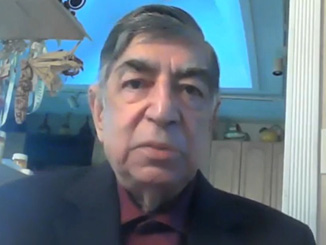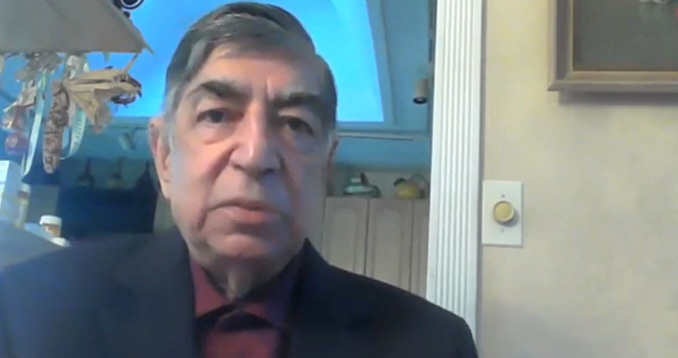

Span News It is 1947. A six-year-old boy born in Lahore is about to enter the first grade when the city erupts in violence. Riots in July and August shut down schools. Children are forced to stay home.
Living with his maternal grandparents, the boy, now over 80, still carries vivid memories of that time.
One memory is standing with his grandfather, hearing their Muslim neighbour implore them to leave their home. “Yahan ke naujawanon ka kuch bharosa nahin hai, kuch galat kar baithe toh hum pachtayenge (we can’t tell trust the youth here, if they do something wrong we’ll regret it),” says the neighbour.
“Raje maharaje badalte hain par praja toh nahin badalti (kings and princes come and go but people don’t change),” replies the boy’s grandfather, Rai Saheb Manohar Nath Razdan.
This phrase will be oft repeated in his family and elsewhere. Rai Saheb can’t understand what’s happening – the term ethnic cleansing today has much meaning but was unknown then.
The grandson Vinod Mubayi, now an eminent retired scientist and scholar based in New York, recalls that the neighbour belonged to the Tiwana clan. People of his grandfather’s generation found their uprooting and displacement incomprehensible. For many, it led to bitterness.
“Partition divided us: Can we be friends?” Dr Mubayi asks, speaking at a recent online talk on this theme, the twentieth lecture of the Dialogues Series, organised by New Socialist Initiative. Drawing upon history and personal stories, he makes a passionate plea for friendship and open communication between the two countries, particularly at the people-to-people level.
Dr Mubayi draws on personal stories to illustrate what Partition meant and continues to mean to those who experienced it. Violence, killing, brutality happened on both sides, he says. Some who were displaced, like his grandfather, were partially compensated in material terms. However, the uprooting and displacement brought other losses which could not so easily be recouped – dispossession, the loss of homes, neighbourhoods, ways of life.
This engendered a kind of bitterness which lives alongside nostalgia for lost homes. It is not surprising that people continue to carry both in their hearts and minds, notes Dr Mubayi – dialectics teaches us that contradictory emotions can co-exist.
Another example of such paradoxical emotions emerges in a story involving Dr Mubayi’s late mother. She had been longing to revisit the home in Lahore where she grew up and gave birth to her three children before Partition took her away.
But when Dr Mubayi’s mother later visited her elder brother in Delhi and shared her excitement, he dismissively retorted, “Everything has been taken from us, why are you telling me these tales now?”
Contradictory feelings thus live on, even among siblings in the same family, and it probably happens in society at large too, comments Dr Mubayi. It is unfortunate that the two states created in the aftermath of Partition have remaind hostile to each other, he added. It is even more tragic that the hostility seems to have become stronger in recent years, with no signs of receding.
And what are the possibilities for the future? Experience over the past 75 years has shown that despite the fraught and tense relationship, the common people of Southasia and in the diaspora easily establish friendships and bonds with each other whenever they get an opportunity, comments Dr Mubayi.
The longstanding linguistic and cultural bonds between India and Pakistan still bind peoples together. As geologist Dr Arun Ahulwalia says, stones have no borders. So it can be with people.
This point cannot be emphasised enough, says Dr Mubayi. If we are to truly work towards establishing peace in the region, we need to work with what we have and build relationships at all levels.
An organisation that has done precisely this, generating some hope through its dedicated work for peace in the region is Sapan, the Southasia Peace Action Network, launched in March 2021. Dr Mubayi is a member of Sapan, as is this writer.
Dr Mubayi appreciates Sapan’s work calling for soft borders and visas on arrival, as well as its groundbreaking monthly discussions on a range of subjects and themes — sport, road safety, the environment, youth, healthcare, Covid-19, the rights of the incarcerated, music and mystics, labour rights, art and activism, and more. Sapan has established itself, Dr Mubayi says, as a group that holds promise and believes in a future of peace.
It is important to set up more such groups of citizens to discuss common issues. Even if we don’t have the resources of the state, at least we will be talking and not trying to score political points, he adds.
Journalist and Sapan founder-curator Beena Sarwar who joined the discussion briefly between other engagements spoke of the importance of “moving beyond the binary of India and Pakistan” and looking at the region as a whole. She also stressed the importance of recognising the differences between and within our own countries – not everything is “the same” as some people say.
So what role can citizens play, asked an audience member. Is there even a point in speaking of people-to-people contact, given that our governments continue to make enemies of each other, and that any change we are able to make is so micro that it hardly touches the macro picture?
We need to begin with ourselves and work towards the change we want to see, responded Dr Mubayi, a view seconded by Beena Sarwar.
Our efforts may be small, but they are not insignificant, added Dr Mubayi. The ongoing Bharat Jodo Yatra being led by Rahul Gandhi, the most prominent opposition leader in India, may not make a dent at a political level but at least it provides people with the feeling that some of the toxic legacies that we are dealing with can be countered, at some level.
This, in the end, is the message of hope that Dr Mubayi wishes to deliver: We have had a long history of division, and it is time we begin to heal and repair relationships.
Working together to address our common issues is a crucial step towards that goal.
Urvashi Butalia is a feminist publisher and writer based in Delhi. Among her publications is the groundbreaking award-winning oral history The Other Side of Silence: Voices from the Partition of India, Penguin, India, 1998; Duke University Press, 2000.
This is a Sapan News syndicated feature available to use with credit to Sapan News Network.

Leave a Reply